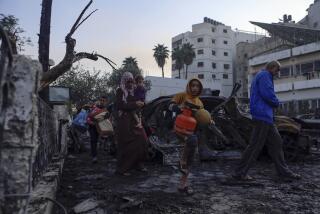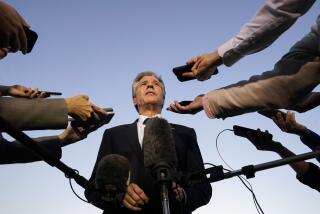Obama lands in Thailand even as Gaza crisis draws his attention
BANGKOK, Thailand -- President Obama landed in Thailand on Sunday to tout his vision of ‚Äúpivoting‚ÄĚ U.S. attention and resources to Asia. But he quickly ran into the challenge faced by his predecessors -- no American president can turn away from the Mideast.
As he arrived for the first stop of a three-country, three-day hopscotch through Southeast Asia, Obama’s attention was drawn to the continuing violence between Israelis and Hamas.
White House aides noted the president was in regular contact with Israeli Prime Minister Benjamin Netanhayu, as well as Egyptian President Mohamed Morsi and other leaders in position to pressure Hamas, all in an effort to defuse what appeared to be an escalating back-and-forth of airstrikes and rocket attacks that had killed more than 40 people.
Obama made his first public remarks on the violence as it entered its fifth day. Speaking at a news conference with Thai Prime Minister Yingluck Shinawatra, the president expressed support for Israel’s stated justification for the airstrikes: the steady onslaught of rocket fire from Gaza into southern Israel.
‚ÄúThere‚Äôs no country on Earth that would tolerate missiles raining down on its citizens from outside its borders,‚ÄĚ Obama said. ‚ÄúWe are fully supportive of Israel‚Äôs right to defend itself.‚ÄĚ
He called on Hamas to halt the attacks, saying such a move would create ‚Äúthe space‚ÄĚ necessary to put back together the shredded and tattered peace process. Without it, the peace process ‚Äúis going to be pushed off way into the future,‚ÄĚ Obama said.
This was not the conversation Obama intended to have on his inaugural voyage abroad as a president with the promise of another four years in office. Obama‚Äôs plans for a quick tour through Thailand, Myanmar and Cambodia were aimed at highlighting diplomatic successes ‚Äď particularly in the reforming Myanmar ‚Äď and laying down fresh markers in the ongoing efforts to assert a greater U.S. role in the Pacific.
Obama‚Äôs strategy hinges on the so-called ‚Äúpivot‚ÄĚ to Asia ‚Äď a broad plan to shift military asset and diplomatic focus to the region after a decade of wars in Iraq and Afghanistan that have consumed U.S. resources and attention.
‚ÄúRestoring American engagement in this region is a top priority,‚ÄĚ Obama said at the news conference.
As the president addressed a ballroom full of media and dignitaries, Secretary of State Hillary Rodham Clinton nodded her head in agreement in the front row. Clinton, who has said she won’t serve another term, was traveling with the president on her last foreign trip.
The two did some light touring before the heavier diplomatic work. Obama and Clinton first visited the 230-year-old Wat Po temple, home of the famous and massive reclining Buddha statue. Guided by a Buddhist monk in tangerine robes, Obama joked that he needed the holy man‚Äôs help to get through his primary domestic challenge: ‚ÄúWe‚Äôre working on this budget, we‚Äôre going to need a lot of prayer for that,‚ÄĚ he said.
Obama then paid a hospital visit to 84-year-old King Bhumibol Adulyadej, whose 66 years on the throne make him the world‚Äôs longest-serving monarch. The president delivered a photo album filled with pictures of the king posing with American presidents going back to Dwight Eisenhower. The last page ‚Äď for the Obama photo ‚Äď was left blank.
The gift fit Obama’s message of reaffirming old alliance. Thailand has the oldest diplomatic ties to the U.S. of any country in the region, stretching back to an 1833 Treaty of Amity and Commerce.
But the relationship is not without strain.
Thailand continues to benefit economically from its status as a regional hub for development in Myanmar, Vietnam, Laos and Cambodia, even as it juggles barely papered-over political divisions. At issue are perceived inequities, a monarchy that critics say is outdated and a festering wealth gap between urban dwellers who have benefited from economic development and many Thais in the rural areas who have not and feel left behind.
This has sparked a series of political crises in recent years, including a 2006 coup, the closing by protesters of Bangkok’s international airport in November 2008 and months of street demonstrations that ended after a police crackdown in early April 2009 near the capital’s Victory Monument.
The country’s elite emerged from the turmoil wary of being too closely aligned with the U.S. and leaning in China’s direction.
‚ÄúThai foreign policy has historically been known as a foreign policy in which Thailand survives by drifting with the breeze,‚ÄĚ said Michael Green, a senior vice president for Asia at the Center for Strategic and International Studies, a Washington think tank. ‚ÄúAnd China is very much the breeze now.‚ÄĚ
Obama‚Äôs trip was about countering that wind ‚Äď and not just in Thailand. From Bangkok, Obama was bound for Myanmar, the first U.S. president to visit the nation that was until recently walled off by an oppressive and insular authoritarian regime. The White House argues that its policy of restoring diplomacy with the government sped the recent move toward reform and claims it as a clear victory for its broader strategy for engagement with isolated nations.
In his remarks, Obama answered critics who argue that the president‚Äôs trip is a premature victory lap around a country still beset with ethnic conflict and where hundreds of political prisoners remain jailed. He said his visit, which follows one by Clinton, was not ‚Äúan endorsement of the Burmese government.‚ÄĚ
‚ÄúI‚Äôm not somebody who thinks that the United States should stand on the sidelines and not want to get its hands dirty when there is an opportunity to encourage the better impulses inside a country,‚ÄĚ he said.
Obama faces similar, though quieter, complaints from human rights activists about his visit to Phnom Penh, Cambodia, where he’ll attend summit meetings on Tuesday.
All three destinations are caught in the tug-of-war between the U.S. and China, said Green, ‚ÄúIn some ways, they‚Äôre sort of the three troubled children of the pivot,‚ÄĚ he said. ‚ÄúEach has a complicated relationship with the U.S. and with China.‚ÄĚ
Still, the troubles in Gaza looked more likely to occupy the president’s agenda in the near term.
ALSO:
Israel destroys Hamas headquarters in Gaza City
Politician Balasaheb Thackeray dies in India; Mumbai on alert
Australian scientists find excess greenhouse gas near fracking
-- Times staff writer Mark Magnier in New Delhi contributed to this report
More to Read
Sign up for Essential California
The most important California stories and recommendations in your inbox every morning.
You may occasionally receive promotional content from the Los Angeles Times.











